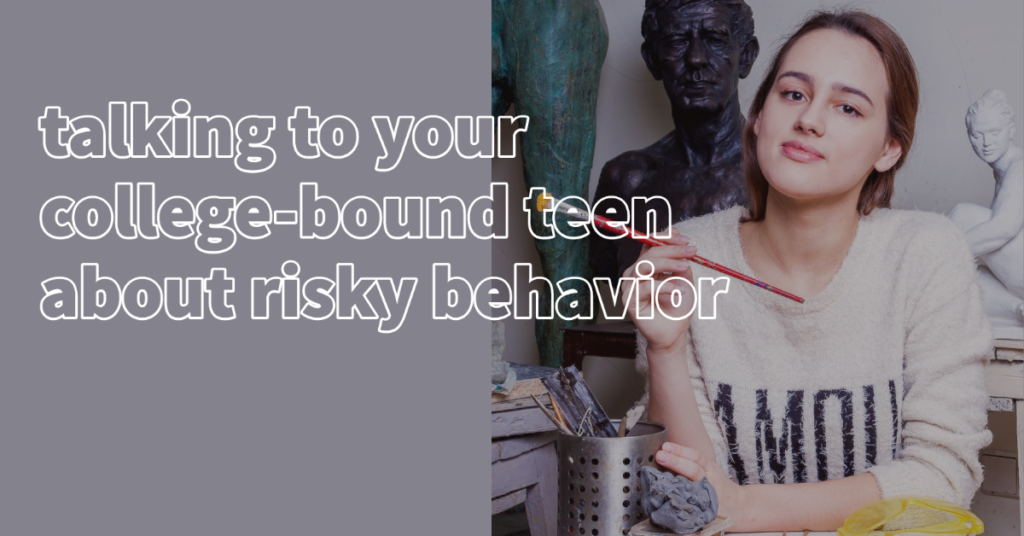
You’re likely to feel a little anxious about the idea of your teen going off to college. Your years of being able to protect and coddle your child are about to end, and you know how cruel the world can be.
One fear that you might have about your teen going off to college is that of drug and alcohol abuse. Many teens face problems such as peer pressure and the need to fit in with the “everybody’s doing it” crowd.
Here are some tips for talking to your teen about the dangers of succumbing to peer pressure and risky behavior in college.
Avoid Sounding Too Autocratic
The tone of your conversation is the most critical factor in reaching your college-bound teen about an essential topic like alcohol and drug abuse.
Young persons tend to get defensive if they feel as though a parental figure is “laying down the law” or restricting their lives. You should approach your child as if you are a friend and not so much a parent.
The best way to approach this subject is to wait until you can have a calm discussion about the matter. You might want to discuss it after dinner or while you’re driving somewhere with your teen.
Reassure Your Teen of Your Love and Trust
Your teen needs to know that you respect their independence and that you trust their judgment. At the same time, you must help them understand that unfamiliar situations are going to arise. They’ll have to deal with people who don’t have the best intentions.
Let your teen know that he or she will come across people from a variety of family backgrounds and cultures. Those backgrounds and cultures might clash with the ones that you established as you were raising your teen.
Tell your child that it’s okay to stand his or her ground and not go along with suggested behavioral changes just because it may seem trendy to others.
Draw From Your Experiences
Storytelling is an effective way to reach your teen about alcohol and drug recovery. It will help you to connect with your teen emotionally, and it will display your empathetic nature.
If you can think of a time that you overcame peer pressure, you should tell your teen a story about it. Tell your child who presented the peer pressure and what you did to overcome it.
Alternatively, you can share an experience that you had experimenting with drugs or alcohol. Be honest if you ever had to seek alcohol and drug recovery.
Use Scientific or News-Based Quotes
Sometimes, young people don’t believe anything until they can see hard evidence that it’s not good for them. In that case, you might want to gather news reports and statistics that pertain to drug and alcohol recovery.
Find articles and statistics about the health hazards of drugs and alcohol. Collect news stories about college students who have suffered the negative effects of drugs or alcohol.
Many students have failed out of college, gotten into accidents, and lost their lives because of substance abuse. Your teen needs to know the reality of such incidents. Don’t sugarcoat the truth at all.
Boost Your Teen’s Self-Esteem
It’s important to point out your teen’s good qualities when you’re discussing peer pressure.
Many teens fall victim to peer pressure because they need to feel as though they belong to a particular group. They desire acceptance, and that desire for acceptance sometimes gets them into trouble.
Spend some time giving your teen positive affirmations that will help encourage self-esteem. Your teen will be less likely to fall into the trap of peer pressure if he or she is aware of all the positive qualities that make that person unique.
A person who has a strong sense of value won’t feel the need to fit in with anyone else.
Establish Positive Communication Lines
Finally, you must establish healthy communication with your college-bound teen. Your teen should feel confident that you will be available for questions or concerns or to tell you about each day away at college.
Let your teen know that you are available to talk at any time of the day or night. You might even want to set up a regular day and time that you can voice or video chat with your teens to let them hear your voice or see your face. Your teen might find a lot of strength in knowing that you’re present even though there’s a distance between you.
The tips mentioned above should help you communicate your concerns to your teen without causing him or her to get offensive. Hopefully, your son or daughter will go on to have a fruitful experience in college and live to his or her full potential.
_______________________________________________
Author Bio: Patrick Bailey is a professional writer mainly in the fields of mental health, addiction, and living in recovery. He attempts to stay on top of the latest news in the addiction and the mental health world and enjoy writing about these topics to break the stigma associated with them.
Sources
- https://www.cdc.gov/healthyyouth/substance-use/index.htm – High-Risk Substance Use Among Youth
- https://www.huffpost.com/entry/how-to-talk-to-your-teen-about-drugs-6-tips-for-parents_b_599236c1e4b0ed1f464c0d98 – How To Talk to Your Teen About Drugs: 6 Tips for Parents
- https://www.harvardbusiness.org/what-makes-storytelling-so-effective-for-learning/ – What Makes Storytelling So Effective For Learning?
- https://www.parentingforcollege.com/2013/04/12/talking-to-kids-about-drugs-and-alcohol-before-they-leave-for-college/ – Talking To Kids About Drugs And Alcohol Before They Leave For College
- https://www.drugabuse.gov/publications/drugfacts/treatment-statistics – Treatment Statistics (DrugFacts)
- https://kidshealth.org/en/teens/self-esteem.html – How Can I Improve My Self-Esteem?



